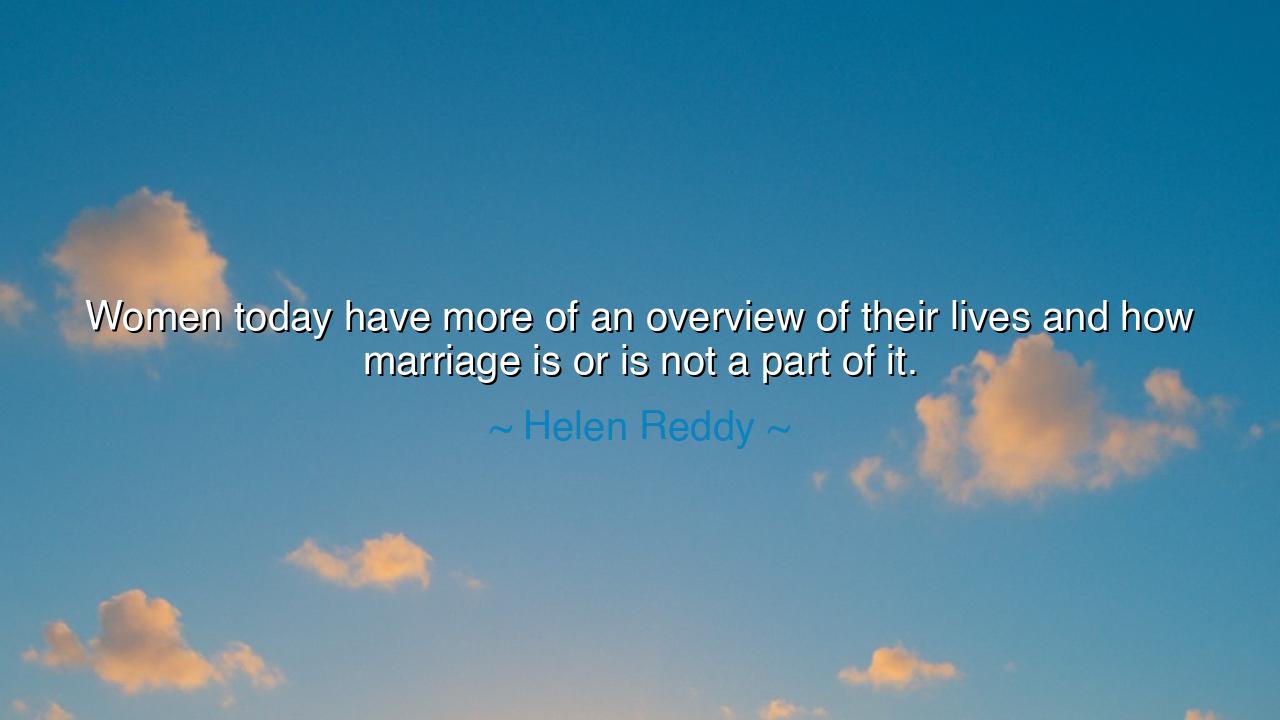
Women today have more of an overview of their lives and how
Women today have more of an overview of their lives and how marriage is or is not a part of it.






In the resolute and visionary words of Helen Reddy, the trailblazing singer and icon of empowerment, there shines a truth born from the long awakening of womankind: “Women today have more of an overview of their lives and how marriage is or is not a part of it.” These words, calm yet revolutionary, carry the strength of centuries of struggle and the light of newfound clarity. They are not a rejection of love nor a condemnation of marriage, but a declaration of freedom and self-awareness—a recognition that a woman’s destiny no longer must be bound to the expectation of union, but may unfold according to her own design.
The meaning of this quote lies in its acknowledgment of transformation—of the great shift in how women perceive themselves and their place in the world. For generations untold, marriage was not a choice, but a destiny imposed. It defined a woman’s identity, her worth, and her purpose. But as the tides of history turned, women began to see beyond the narrow walls of tradition. Education, opportunity, and the awakening of the feminist spirit allowed them to step back, to see their lives from a higher vantage point—a true overview. From that height, they could discern the truth: that marriage may be one path among many, not the sole measure of fulfillment. Reddy’s words honor that awakening, celebrating the courage of women who now choose love freely rather than fearfully, consciously rather than automatically.
The origin of this insight is woven deeply into Helen Reddy’s own journey and the broader movement she helped voice. In the 1970s, amid the rise of the women’s liberation movement, Reddy became a symbol of empowerment through her song “I Am Woman.” That anthem became a roar across nations—a declaration that women would no longer be confined to the shadows of dependency. Her statement about marriage reflects the same spirit. Having herself experienced the complexities of love and independence, Reddy spoke as one who had seen both sides of the human bond: the comfort of connection and the necessity of selfhood. Her words are not rebellion against marriage, but redemption for the individual—a reclaiming of the right to choose whether or not to bind one’s life to another.
History offers us a living mirror for her insight in the story of Simone de Beauvoir, the philosopher and author who defied convention by refusing to marry her lifelong partner, Jean-Paul Sartre. Together, they shared intellect, passion, and purpose without the chains of expectation. De Beauvoir’s choice was radical for her time, for she saw that her identity as a woman and thinker could not be contained within the traditional structure of marriage. She, like Reddy, recognized the importance of having an overview—the ability to step back and see one’s entire life as a canvas to be painted freely, rather than as a picture pre-drawn by society. Their stories, though separated by art and philosophy, share the same essence: the triumph of conscious living over cultural compulsion.
And yet, Reddy’s words are not an anthem of separation, but of balance. She does not say that marriage is obsolete—only that it must now take its rightful place as a choice, not a destiny. In the ancient order, marriage was the center around which a woman’s world revolved. But in the new order she describes, it becomes one part of a larger constellation. The modern woman can see her life as a whole: her career, her purpose, her dreams, her relationships, all connected in harmony. Marriage, if it comes, should complement that harmony, not define it. Her message calls for wholeness before union—for the understanding that love between two complete individuals is stronger than love born of incompleteness.
Her statement also speaks to the evolution of identity. To have “an overview” is to possess wisdom—to see one’s existence not as a sequence of duties, but as a tapestry woven with intention. It means understanding that fulfillment comes from self-knowledge, and that no external structure—whether marriage, career, or family—can replace the inner work of becoming. Reddy’s vision was prophetic: she foresaw a time when women would stand as architects of their own destinies, shaping their lives by choice, not compulsion. She honored those who choose marriage as sacred, and those who walk alone as equally sacred. In her view, freedom and love are not opposites—they are partners, each nourishing the other.
Therefore, O listener, take this lesson into your heart: live with awareness, and let your choices arise from truth, not tradition. If you choose love, let it be chosen freely; if you choose solitude, let it be embraced without shame. Do not allow society to write your story before you have taken up the pen. The essence of Reddy’s wisdom is this: that every human being—woman or man—must rise high enough to see their life in full, to make decisions not from fear of judgment but from love of self.
And so remember the eternal wisdom of Helen Reddy, who sang not only with voice but with vision: that liberation is not the absence of love, but the presence of choice. To have an overview of one’s life is to live as the ancients taught—to know thyself, to act with purpose, and to walk with courage upon the path that is truly your own. For only then, whether joined or solitary, the soul stands free—and freedom, above all else, is the truest form of love.






AAdministratorAdministrator
Welcome, honored guests. Please leave a comment, we will respond soon